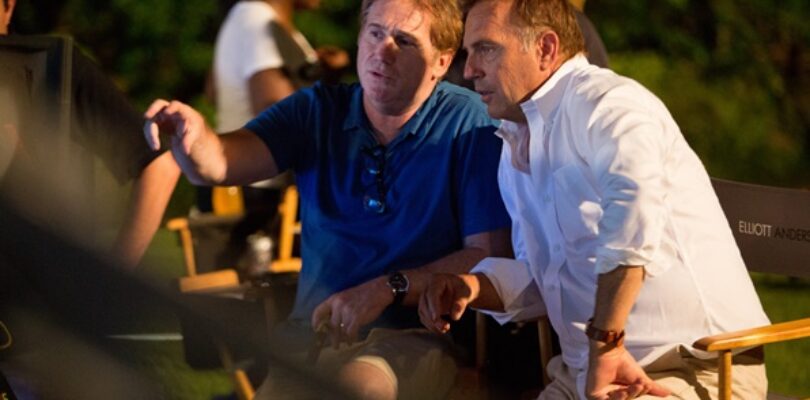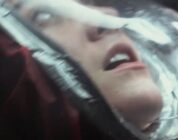Black or White is the story of a grandfather, Elliott Anderson (Kevin Costner), who is suddenly left to care for his granddaughter, Eloise (Jillian Estell), by himself. But, when her paternal grandmother, Rowena Jeffers (Octavia Spencer), seeks custody with the help of her lawyer brother (Anthony Mackie), poor Eloise is caught between two families. With the best intentions, both families fight for what they feel is right and are soon forced to confront their true feelings about race, forgiveness, and understanding.
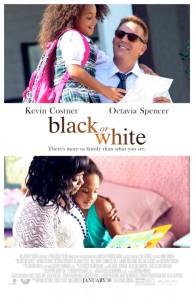 The writer/director of Black or White, Mike Binder, a native of Detroit, Michigan, is an award-winning and well-regarded actor, writer, director, and producer. Binder’s directorial debut came in 1992 with Crossing the Bridge and has included such acclaimed films as Reign Over Me (2007) and The Upside of Anger (2005), which also starred Costner. Actor Anthony Mackie, is perhaps best known as Sam Wilson/Falcon from Captain America: The Winter Soldier (2014). But his numerous stage roles and appearances in such films as Pain & Gain (2013), Real Steel (2011), and The Hurt Locker (2008) are adding to his already impressive body of work.
The writer/director of Black or White, Mike Binder, a native of Detroit, Michigan, is an award-winning and well-regarded actor, writer, director, and producer. Binder’s directorial debut came in 1992 with Crossing the Bridge and has included such acclaimed films as Reign Over Me (2007) and The Upside of Anger (2005), which also starred Costner. Actor Anthony Mackie, is perhaps best known as Sam Wilson/Falcon from Captain America: The Winter Soldier (2014). But his numerous stage roles and appearances in such films as Pain & Gain (2013), Real Steel (2011), and The Hurt Locker (2008) are adding to his already impressive body of work.
Binder and Mackie recently spoke with CinemaNerdz about making Black or White, the impact of race on the film and culture in general, and, of course LEGOs. After we were all introduced to one another, Mr. Mackie cracked a few jokes, then Mr. Binder said they had had a long day and that Anthony was happy because he going to fly home right after we spoke, but that they would try to get him to behave for at least the next few minutes. What follows is a transcript of that conversation.
[divider]
CinemaNerdz: Was there ever a time when you were self-conscious about this film, given recent polarizing racial events in this country?
MIKE BINDER: Well, first of all, they didn’t exist when I wrote and directed the movie. But the thing is, I did kind of chicken out. I made my nephew a little girl and I created a custody battle that never existed for us because we always got along with [my nephew’s] grandmother and all those aunts and cousins. But, by the same token, you know there was some trepidation of do I really want to do a movie about race? And do I really want to do a movie that is going to be fighting uphill? Certain audiences won’t want to see it. Studios don’t want to finance it. They don’t want to release it. Do I really want to do this? Why don’t I just make a silly comedy or something? But, I’m not bent that way. So, it’s a good question, but the fact is once you jump in the water, you might as well start swimming.
CinemaNerdz: With regards to the “hair” scene, you didn’t do your nephew’s did you?
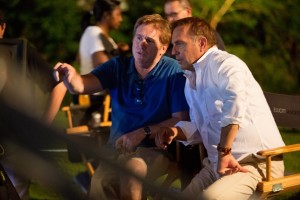
Director Mike Binder discusses a scene with star Kevin Costner on the set of Relativity Media´s “BLACK OR WHITE.” © 2014 BLACKWHITE, LLC Photo Credit: Tracey Bennett.
BINDER: No, no, my nephew would never let me touch his hair. As it happens, my daughter’s best friend is a little [black] girl – they could be sisters they’re so close. They’ve been best friends since kindergarten, so she stays at our house a lot. There were mornings where it was all about this girl’s hair. I would see them…just trying to comb her hair out. It was just hours of hair talk. And I always thought, okay that’s fun.
CinemaNerdz: I’ve heard some people say that that is their favorite scene in the film and that it was a good example of what daily struggles are like for people with that type of hair texture.
BINDER: I never knew that until my daughter’s friend came into our lives.
CinemaNerdz: What are some of your favorite scenes in the film?
ANTHONY MACKIE: I think all of Octavia’s scenes are my favorite scenes. I love when Kevin comes over to the house and she’s at her desk in the garage. I love when she makes fun of him telling him to take an old drunk man’s bubble bath. There’s just a lot of little things like that that she did that she brought to that character – a sense of pride – that, because I have so many sisters and aunts, I really enjoyed seeing.
BINDER: I love the scene where Kevin reads Jillian the nighttime story. She reaches up and kisses him in the middle of the scene and that breaks him up. I thought that was great. She improvised that kiss. It was just so real to me. I was in the other room watching it on the monitor and I went, “Oh, that’s in the movie.” I love that scene.
[springboard type=”video” id=”1408343″ player=”cnim002″ width=”630″ height=”315″ ]
CinemaNerdz: Was there any hesitation to depict a single father raising a daughter instead of a single mother raising a son, which is a more common character dynamic?
BINDER: That’s why I liked it. That’s why I switched it. I could have done the real thing, with the little boy. I just thought it was more interesting. With little girls, you don’t know what to do and say, you know. You’re just so much more careful when you’re raising a little girl. If you add that to his drinking and to his anger, there are just all kinds of ways you can hit the tilt button raising a little girl in that world. I felt that it would make for more drama.
CinemaNerdz: She was very good for him, almost like a surrogate wife. Which was evident when they were making pancakes and she kept telling him to “set the table.”
BINDER: It’s funny you say that, there was a flashback [scene] with his wife that I didn’t put in the movie, and she would say that every time: “Set the table. Set the table.” So that when the little girl says it, you know she’s seen her grandma saying that. But, [I think] it came across anyway.
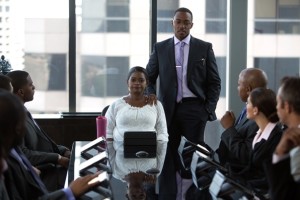
Octavia Spencer and Anthony Mackie star in Relativity Media´s BLACK OR WHITE. © 2014 BLACKWHITE, LLC Photo Credit: Tracey Bennett.
CinemaNerdz: It did. Mr. Mackie you gave a convincing performance as an attorney….
MACKIE: Thank you.
CinemaNerdz: How did you prepare for the role?
MACKIE: When I first signed on to this movie, Mike told me to watch this movie called The Verdict. I’d always wanted to be on Law & Order and stuff like that. So, it became very clear to me that the truth is not what is in reality, the truth is what wins the case. I felt that if I stayed on those lines and [maintained] the subtlety Mike wanted me to bring to [the role], if I just stayed within that, I felt like the character would work. I felt like there’s a certain level of letting you talk yourself into a hole, and once you’re in that hole, you can’t dig your way out. I think that was something that I wanted to capture with him.
CinemaNerdz: What did each of you learn about yourselves making this film?
MACKIE: You know, it’s interesting, when I read the script then [and] now, seeing the finished product, the biggest lesson I learned is just watching little Jillian. I have two sons and it’s very important for me for them to grow up in way that they understand the importance of being a black man, but also [that they] understand the importance of how to judge people for who they are and not how they look. I want people to look at my sons and see black men, but I also want people to talk to my sons and see who they are before they cast judgment. So, I tell my sons every day when they go to school. You play with the kids who share the LEGOs. Those are the good people. If they don’t share the LEGOs, those are the bad people – black or white. That’s the reality that I want to raise them with until they get to the next phase of their lives and I have to teach them accordingly, but right now it’s about the LEGOs.
BINDER: I just wanted to work with actors that would share the LEGOs. (Everyone laughs) You make this movie, it does change you. You make this movie, you watch it with people, you talk about it, and you edit it – it changes you and it makes you realize you want to be better. You really want to be the kind of person that will judge people based on who they are and not what they are. For some people, maybe that comes naturally to them, but I think a lot of that is a product of your environment and what you’ve been taught, but also what you put into your own head. I think this movie has made me want to be better at it.
[springboard type=”video” id=”1408345″ player=”cnim002″ width=”630″ height=”315″ ]
CinemaNerdz: In that way, the film showed a lot of humanity.
BINDER: Yeah, listen, there’s a lot to be learned from people that aren’t like you. I think a lot of times hanging out with people that are too much like you is unhealthy.
CinemaNerdz: You stop growing, in an emotional sense.
BINDER: That’s right.
CinemaNerdz: I think that interplay of cultures is something you captured well with the relationship between Elliott and the character of Duvan (Mpho Koaho).
BINDER: I’ll tell you something interesting. This is [an example of] how much everyone brings their own thing. There are people that have seen that [character] as a racial stereotype. I cannot understand it. I have never seen that character before. I have had people write that they have a problem with that character. When you’re talking about race and stereotypes and characterization of people, everybody’s going to see this movie differently. It’s almost like a Rorschach test. You just have to be okay with that as a writer and director.
[pullquote_left]There’s a lot to be learned from people that aren’t like you.[/pullquote_left]CinemaNerdz: Mr. Mackie, I overheard a young man ask you about being able to deal with success, would you care to elaborate on that?
MACKIE: That young man asked a very important question, and a very smart question. [It is] the question that I feel most young black men ask, but never get the real answer to. What he was really asking was: “How do you keep your dignity in the face of success?” A lot of times young black men feel like they have to sell out their dignity, sell out their awareness, sell out their swag to be successful. That’s what he was really asking. The problem is that there is no right answer to that question because your person is very different than mine. It’s scary because we’re coming to a place where more young men are graduating from college. More young men are being influential fathers. So how do you keep the person you grew up with and take that into the professional world where most of the people in that world are threatened by it?
CinemaNerdz: Mr. Binder, can you discuss how you researched and developed the relationship between Rowena and her son, Reggie (André Holland)?
BINDER: I have a wife and a son, that’s all I need. It’s a running textbook. I have a wife and a twenty-year-old son and they’ve been doing that same dance since he was sixteen and he first, between us, got into drugs, smoking pot and doing all the shit that he does. I will sometimes say that line say to my wife, it came from me, “You live in a blind spot when it comes to [him]. You don’t understand.” And she just claims it’s everyone else’s fault, all the time. It’s the teachers, the students, the colleges, it’s his roommate. I think that’s a very common thing with mothers. One of the reasons why is because they have so much love for their boys that they are easily conned. When you know someone loves you so unconditionally, you can sell them anything. My son can sell my wife anything. And he does. It was a natural character dynamic for me to write.
CinemaNerdz: Why the decision to do the same sex couple, featuring two black women?
[pullquote_right]You can’t do this movie and have everybody love it.[/pullquote_right]BINDER: Maybe a little fantasy? (Everyone laughs) No, no, no. Honestly, I like the idea that gay couples are getting married and having real families. I think it’s time for that. You will never get that toothpaste back in the bottle. That’s where our society is going and I was trying to show how much love was down there and how much openness and different kinds of love [can exist]. I just wanted a gay family and I didn’t want to say much more than they’re gay. There was one more joke in there, but it didn’t fit. Every time Rowena would introduce them she would say: “This is my daughter and her little cute gay family.” Finally, the daughter says, “I asked you before, stop referring to us as gay. We’re just a family. You don’t have to say gay all the time.” And Rowena says “It’s a gay family.” It was too jokey. I just thought it would be fun to have [the relationship] in the movie and I bought Rowena having a gay daughter and loving the hell out of her.
CinemaNerdz: Of course, she kept a sort of compound of family all around her.
BINDER: Yeah, I mean, listen, to me, when you’re writing these movies, the characters you’re writing, collectively, all the writers in the world…we’re dreaming for everybody else. That’s what art is, that’s consciousness. Jules Verne was doing submarines a hundred years before there were submarines, but he was doing them. I think we’ve got to start depicting things without over talking when depicting them. It’s just a gay family. It’s okay.
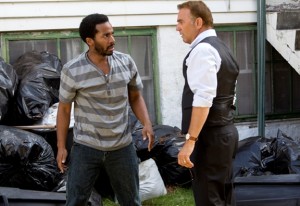
Kevin Costner and Andre Holland star in Relativity Media’s BLACK OR WHITE. © 2014 BLACKWHITE, LLC Photo Credit: Tracey Bennett.
CinemaNerdz: There was a lot of humor in this film, but there were also a lot of emotionally charged scenes, such as the confrontation between Elliott and Reggie in the street where Elliott uses the “n” word. Were there any difficulties filming a scene such as that?
BINDER: The only problem with the street scene was that that day, Paula Deen lost her whole career because she had used the “n” word in 1960. So, here’s Kevin Costner and people are going, “Should we do an alternative? Is this going to ruin Kevin’s career?” There was talk about that among his partners and producers. To his credit, he went “Hell no we’re not shooting an alternative.” But that was the only problem with that day. Anthony, Octavia, Kevin, and I are pretty sure people in who we are and where we are in terms of race. We don’t doubt. None of us are so race obsessed or feel insecure with our feelings about race, so we just went at this thing like a movie.
CinemaNerdz: Are there any reactions to the film you’ve experienced that stand out for either of you?
MACKIE: For me, the reaction has been overwhelmingly positive. I feel like we’re at a place where black people want to talk about it and white people want to talk about it, but they don’t really know how. Like everyone’s on eggshells. How do you go to a black person and say, “Race, so, what’s up?” It’s this whole victim/villain game and I feel with this movie people have found it a firm, neutral ground to jump off of and be able to have that conversation. So those are the responses that I’ve been getting which is about seventy-five percent of the reason why I wanted to do the movie, so I’m happy about that.
BINDER: My favorite was when the Attorney General Eric Holder in Washington came out to see the movie and came right up to me and said, “Mr. Binder, you’ve nailed it.” I said, “Really? Even the legal stuff?” He went, “Well, that was a little fudgy, but the movie was awesome.” And Valerie Jarrett loved it. The head of the NAACP loved it. I’ve been really excited. I have had people that I respect [enjoy the film], the writer Gay Talese wrote me a beautiful note. It’s been interesting. And there’s been a lot of people that just didn’t get it and wrote some stuff that said it was a white man’s excuse for racism, which I don’t get. Again, you can’t do this movie and have everybody love it. You just can’t. By and large, I’m really happy with the reaction it’s gotten.
[divider]
See Black or White in theaters on January 30th, 2015!

